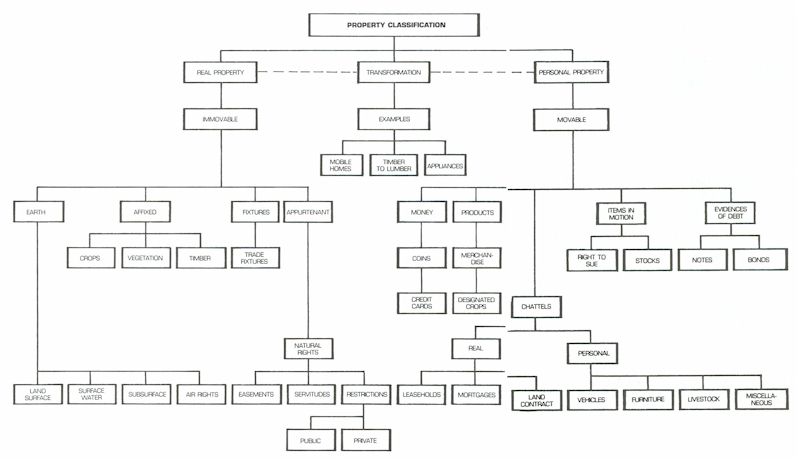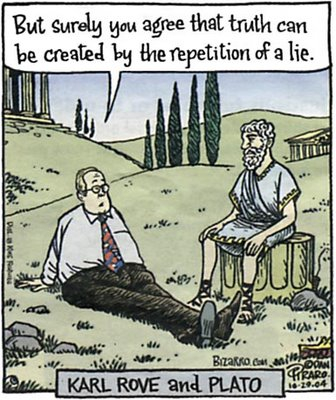Dear cons, neocons, and libertarians:
Your notions of private property, property rights, and taxation seem a little naive to me.
I am not a lawyer but I know something about the laws of real property (real estate law). I proposed and lobbied for the Tennessee Conservation Easement Act of 1981 and some TN legislators and lawyers considered me one of the state’s best experts on property law at the time. While my legal, historical, and philosophical knowledge of property ownership mainly concerns real property, many of the same principles apply to personal property, too.
I am a progressive, but several of my close friends have been Ayn Rand Libertarians, “lazy-unfair”capitalists (thanks to Natural Lefty for that turn of phrase), and free-market fundamentalists. If I mis-state any of your beliefs please correct me.
The arguments I have seen in support of absolute private property ownership fall into two categories: appeals to natural law and appeals to utility.
I. The appeal to “natural law” and “natural rights“. Libertarians and some conservatives view private property rights as the foundation from which all other natural rights extend. There are several problems with this:

From The Jungle Book by Rudyard Kipling. (Click image for full quotation)
A. Despite the musings of many erudite (if old-fashioned) philosophers, in the state of nature there is but one right: “might makes right” (Vae victis). Any other right can only be the result of imposing positive (artificial) law.
B. In the state of nature there is but one law: “might makes right” (Vae victis), again. Any other result can only be:
1) another case of imposing positive (artificial) law, or
2) the “law” of unintended consequences (this includes all biological and physical laws such as gravity, etc.)
C. In nature, possession is 100% of the law. The only private property is that which one can take and hold by force. If you can take it from someone else it becomes yours. If they can take it back or induce you to give it back it is theirs again. Natural social behavior might seem to introduce more laws, such as in the “law of the pack” and “pecking order”, but in nature these are simply either:
1) proxies for force which must be regularly backed up by force–there is no court of law, or
2) they are the product of genetically encoded, involuntary, instinctive responses to chemical or physical signals as in the case of social insects and bacteria.
D. Without the rule of law, predictably and impartially managed by society, property is nothing but a temporary possession maintained by private force. If the existence and persistence of private property depends upon a public legal infrastructure, then private property as we know it is a public creation. The public, which creates the “privateness” of the property and preserves it by force of law, always has a proprietary interest in any such property–by the principle of natural law! If this is too hard to wrap your head around, consider this–in any contest between private force and state force, the state wins. The only exception is a successful revolution or coup (Good luck with that!).
E. Many of the philosophers who have argued for “natural law” have conflated it with divine law, nature simply being a proxy for the divine creator. This attitude has passed by inheritance to modern-day conservatives and libertarians. Property, once the divine right of kings, is now the divine right and manifest destiny of whoever has the latest legal claim. In this tradition, the owner has an absolute (thus divine) right to his property which supersedes all other claims. The public interest, the interests of future generations, or the survival of the planet be damned. There are two problems with this argument:
1) This is thinly veiled religion which, in the possible absence or indifference of the necessary deity, amounts to little more than anarchy.
2) This “absolute” natural right can be magically dissolved by signing a piece of paper, just as any other so-called natural right of man can be signed away or even automatically abdicated simply by accepting casual employment. This reveals that the natural right, just like the natural man (the supposed “king of his castle”), is actually nothing more than chattel (from the word cattle–in law, any movable property; also used to refer to slaves, wives, and minor children).

Many of the categories above include additional rights or attributes not listed. (Click image for article on “Bundle of rights”)
II. The appeal to utility
A. Proponents of the absolute right to private property claim that it promotes the common good in the same way that greed supposedly promotes the common good in the “free market”. They rely on an “invisible hand” to make everything work out for the best even if each person acts purely out of greed, ambition, paranoia, malice, delusion, or any other form of vice, depravity, or pathology.
B. To be fair, they assert that an owner will always act in his own best interest and that the utility of absolute private ownership follows from this (with a little invisible helping hand still required). They assert that an owner will rarely fail to act in his own self-interest. However, only if every property owner acted in his fully enlightened self-interest could the appeal to general utility succeed. That test is clearly unmet. Most owners are not only unenlightened they are predictably irrational. The “rational agent” theory has been fully discredited in psychology, sociology, neuroscience, and even in economics (which tends to fall somewhat behind the curve in theories of human behavior).
C. Science has debunked the invisible hand for failing to deal with irrational agents, externalities, and information asymmetry:
1. Nobel Prize economist Joseph E. Stiglitz wrote:
“Adam Smith, the father of modern economics, is often cited as arguing for the “invisible hand” and free markets: firms, in the pursuit of profits, are led, as if by an invisible hand, to do what is best for the world. But unlike his followers, Adam Smith was aware of some of the limitations of free markets, and research since then has further clarified why free markets, by themselves, often do not lead to what is best. As I put it in my new
book, Making Globalization Work, the reason that the invisible hand often seems invisible is that it is often not there.
Whenever there are “externalities”—where the actions of an individual have impacts on others for which they do not pay, or for which they are not compensated—markets will not work well. Some of the important instances have long understood environmental externalities. Markets, by themselves, produce too much pollution. Markets, by themselves, also produce too little basic research. (The government was responsible for financing most of the important scientific breakthroughs, including the internet and the first telegraph line, and many bio-tech advances.)
But recent research has shown that these externalities are pervasive, whenever there is imperfect information or imperfect risk markets—that is always.
Government plays an important role in banking and securities regulation, and a host of other areas: some regulation is required to make markets work. Government is needed, almost all would agree, at a minimum to enforce contracts and property rights.
The real debate today is about finding the right balance between the market and government (and the third “sector”—non-governmental non-profit organizations.) Both are needed. They can each complement each other. This balance differs from time to time and place to place.[11] (Wikipedia: Invisible Hand)

(click image for article on “Invisible Hand”)
2. Noam Chomsky, while acknowledging the intelligence of Smith’s thesis, wrote:
Throughout history, Adam Smith observed, we find the workings of “the vile maxim of the masters of mankind”: “All for ourselves, and nothing for other People.” He had few illusions about the consequences. The invisible hand, he wrote, destroys the possibility of a decent human existence “unless government takes pains to prevent” this outcome, as must be assured in “every improved and civilized society.” It destroys community, the environment, and human values generally—and even the masters themselves, which is why the business classes have regularly called for state intervention to protect them from market forces.[12] (Wikipedia: Invisible Hand)
3. The political economist E.K. Hunt:
[Hunt] criticized markets and the externalities emerging from market exchanges as being a route for self-advancement at the expense of social good. Hunt helped contribute to the literature on heterodox economics, helping to coin the term “invisible foot” in contrast to a presumably beneficient “invisible hand”. Hunt wrote:
“If we assume the maximizing economic man of bourgeois economics, and if we assume the government establishes property rights and markets for these rights whenever an external diseconomy is discovered [the preferred “solution” of the conservative and increasingly dominant trend within the field of public finance], then each man will soon discover that through contrivance he can impose external diseconomies on other men, knowing that the bargaining within the new market that will be established will surely make him better off. The more significant the social cost imposed upon his neighbor, the greater will be his reward in the bargaining process. It follows from the orthodox assumption of maximizing man that each man will create a maximum of social costs which he can impose on others. D’Arge and I have labeled this process “the invisible foot” of the laissez faire … market place. The “invisible foot” ensures us that in a free-market … economy each person pursuing only his own good will automatically, and most efficiently, do his part in maximizing the general public misery. “(Wikipedia: Invisible Hand)
D. Without an invisible hand, the only interested party left around to represent the common good, the public interest, future generations, and the planet, and “to promote the general welfare” (as per the Preamble to the US Constitution), is (no big surprise to progressives) the public. The public interest is a proprietary interest in a portion of the bundle of rights which make up ownership. The public owns this proprietary interest by virtue (as stated before) of natural law!
E. For the appeal to utility to succeed, owners must put their property to its “highest and best use”. This condition is clearly not satisfied. The proponents of absolute private property rights often argue that it is government interference, (zoning, environmental regulation, nuisance laws, etc.), which prevents private owners from achieving the highest and best use of their property, and that such interference is a “taking” of their property. There is law on both sides of this argument and owners are free to file their claims in the proper court of jurisdiction– the venue which they argue is the only proper source of remedy.
Corporate ownership of property
Corporations are chartered by state law. Originally, the justifications for corporate existence were 1) to carry out a specific, narrow set of activities which the state agreed would serve a public need, and 2) to limit the personal legal liability of the investors and operators which might otherwise inhibit achieving that public good for which the corporation was chartered. Classic examples are the early railroad corporations and hospitals. These served fundamental public needs and the liability issues acted as serious impediments to private developers and operators.
Today, the typical corporate charter includes a catch-all “or for any other legal purpose” article. Now, if corporations were intended to operate “for any other legal purpose”, the entire idea of a charter listing the intended purposes is entirely superfluous. Obviously, a corporation was originally intended to operate only for a very limited set of explicit, pre-defined purposes and those purposes were expected to serve an explicit, pre-defined public need, not simply any private purpose that a corporation might improvise from day to day.
In addition to limiting liability (thus removing a disincentive to meeting a critical public need) the state grants certain other privileges (not rights) to the corporation which are essential to conducting its business:
1. The privilege of acting as a party to such legal contracts as may be necessary for the conduct of its explicit, pre-defined business activity.
2. The privilege of owning such tangible and intangible property (such as cash, real property, and intellectual property) as may be necessary for the conduct of its explicit, pre-defined business activity.
Now, unless an explicit pre-defined public need is to be served, what is the incentive for the state to specially limit the normal legal liabilities of the corporate investors and operators, including the liabilities incurred by its power to enter into contracts, and to grant it the privilege to hold property in perpetuity without any of the taxes that natural people and families must pay to transfer property among themselves and their successive generations? There are none. Such a charter, uncoupled from any explicit, pre-defined, compelling public need, would serve no legitimate purpose for the state, and could only be considered a form of fraud, graft, or corruption.

Any extra grant of rights to a corporation beyond those described above, or any post hoc, improvised expansion of its scope of operation, is a direct contradiction of the core raison d’etre of corporations and is blatantly contrary to the public interest.
The privilege of corporate property ownership is subject to an explicit lien held by the state in the form of the corporate charter and the explicit Constitutional duty of the US Government, whose boss is the We The People, to serve the public interest and to promote the general welfare.
Nevertheless, over the years government was motivated to liberalize the purposes for which a corporation might be granted a charter because it could impose double taxation by taxing both the corporate income and the dividends paid to investors. This was little more than institutionalized bribery–the state granted perpetual property ownership and limitations of liability in exchange for double taxation.
It has not been a fair exchange. In the intervening years since chartered purposes were broadened to include such things as “making shit loads of money” and “any other legal purpose”, corporations have grown increasingly powerful and the contribution of corporate taxes to the public treasury have steadily eroded away.
By Cassandra Q. Butts, April 10, 2004
The news that more than 60 percent of U.S. corporations failed to pay any federal taxes from 1996 through 2000 when corporate profits were soaring and that corporate tax receipts had fallen to just 7.4 percent of overall federal tax revenue in 2003 – the lowest since 1983 and the second-lowest rate since 1934 – is an outrage. But it should come as no surprise to anyone who has been paying attention to national tax policy over the past few years. The General Accounting Office (GAO) report also found that an astonishing 94 percent of corporations reported tax liability of less than 5 percent of their total income during the same time period…
With Tax Day (April 15) fast approaching and the Bush administration continuing to make the case that the Bush tax cuts have benefited American families, the GAO report could not be timelier in painting a far less rosy picture. Both the GAO study and the historical record support the conclusion that any benefit working families have received from the Bush tax cuts has been more than offset by the additional tax burden they must bear because corporations no longer pay their fair share of taxes.
As the GAO study documents and the historical record proves, corporate tax dodging is directly linked to the reduction of corporate tax revenues. Corporate tax receipts dropped from an average of 4.8 percent of GDP during the 1950s to 1.3 percent of GDP in FY2003. Treasury Department figures show that actual corporate income tax revenues fell 36 percent from FY2000 to FY2003. And while the statutory corporate income tax rate is 35 percent, the effective corporate tax rate – the actual share of corporate taxes paid on corporate profits – has averaged just 26 percent since 1993, according to the Congressional Research Service…
Estimates of the cost of corporate tax loopholes have been projected at upwards of $50 billion a year, according to Citizens for Tax Justice.
As corporate tax receipts decreased, payroll taxes, the most regressive of all taxes, increased dramatically. Specifically, payroll taxes increased from 1.6 percent of GDP in FY1950 to 6.8 percent of GDP in FY2002, surpassing both corporate income taxes and excise taxes in their contribution to total federal receipts. This rise in payroll taxes represented a 30 percent increase in the contribution of payroll taxes to overall federal revenues.
At the same time, individual income taxes also increased in the past half century as both a percentage of GDP and in their relative contribution to total federal tax receipts. Individual income taxes rose from 5.8 percent of GDP in FY1950 to 8.3 percent of GDP in FY2002.
During the Bush-Cheney years, the largest corporations (now transnational entities with no allegiance to the US) completed the process of taking the US Government (at its own invitation) captive, as both Thomas Jefferson and President Dwight Eisenhower had predicted they would.
The original reasons for corporate existence and corporate privileges have gradually dwindled away. The only justification that remains, according to conventional wisdom, is jobs. That justification is false. The corporate enterprise has no inherent advantage as a creator of jobs other than its advantage in destroying unincorporated employers and self-employment by leveraging its special advantages of perpetual life, limited liability, market monopolization, and corrupting political influence to force out competition. This is diametrically opposed to the long term public interest and maintaining a balance of power between popular sovereignty (democracy) and rule by the wealthy (plutocracy).
“The word plutocracy is derived from the ancient Greek root ploutos, meaning wealth and kratos, meaning to rule or to govern.”
“Before the equal voting rights movement managed to end it in the early 20th century, many countries used a system where rich persons had more votes than poor. A factory owner may for instance have had 2000 votes while a worker had one, or if they were very poor no right to vote at all. Even artificial persons such as companies had voting rights. In the US, it would take until 1945 before persons living on welfare and persons in personal bankruptcy would get voting rights.” (Wikipedia)
Michael Moore’s recent movie, “Capitalism – A Love Story” mentioned secret reports that Citigroup circulated to their wealthiest clients explaining a concept they called “plutonomy” –a blend of pluto– (wealth) and economy. A plutonomy is a system in which economic growth is both powered by and consumed by the rich. In other words, a plutonomy is a society of the rich, for the rich, and by the rich.
The Secret Citigroup Plutonomy Reports:
“We [Citigroup]… posit that:
➤ The world is dividing into two blocs – the plutonomies, where economic growth is powered by and largely consumed by the wealthy few, and the rest.
➤ We project that the plutonomies (the U.S., UK, and Canada) will likely see even more income inequality…”
Full report: Citigroup-Oct-16-2005-Plutonomy-Report-Part-1
“Revisiting Plutonomy: The Rich Getting Richer
➤The latest Survey of Consumer Finances, for 2004, has been released by the Federal Reserve. It shows the rich continue to account for a disproportionately large share of income and wealth in the US economy: the richest 10% of Americans account for 43% of income, and 57% of net worth. The net worth to income ratio for the richest 10% of Americans increased from 7.4x in 2001, to 8.4x in the 2004 survey. The rich are in great shape, financially.
➤We think the rich are likely to get even wealthier in the coming years. Implication 2: we like companies that sell to or service the rich – luxury goods, private banks etc. Favored names include LVMH and Richemont.”
➤RISKS — WHAT COULD GO WRONG?
Our whole plutonomy thesis is based on the idea that the rich will keep getting richer. This thesis is not without its risks. For example, a policy error leading to asset deflation, would likely damage plutonomy. Furthermore, the rising wealth gap between the rich and poor will probably at some point lead to a political backlash. Whilst the rich are getting a greater share of the wealth, and the poor a lesser share, political enfrachisement remains as was — one person, one vote (in the plutonomies). At some point it is likely that labor will fight back against the rising profit share of the rich and there will be a political backlash against the rising wealth of the rich. This could be felt through higher taxation on the rich (or indirectly though higher corporate taxes/regulation) or through trying to protect indigenous laborers, in a push-back on globalization — either anti-immigration, or protectionism. We don’t see this happening yet, though there are signs of rising political tensions. However we are keeping a close eye on developments.
According to Jamess at the Daily Kos Blog on 10/04/09
“Those [Citigroup] reports, since leaked, plainly discuss the power of the Plutonomy in America, and how it would only strengthen, as long as the “the rest us” (the non-plutonics) could be kept in the dark about the Plutonomy existence, its role, and its over-arching control in the American Economy”
Even though the Plutonomy (the top 1%) control over 50% of the net worth in America — they don’t control the Votes!
The thing they most fear is the principle of “one person — one vote”.
You see despite their extreme wealth and power, they only have 1% of the vote; “the rest us” control the other 99% of the votes.
We, the People
Plutocracy and plutonomy are not the same as democracy and they are not compatible with democracy. They are antithetical to democracy and the liberty of “We, the People“.
The Preamble to the US Constitution reads:
“We the People of the United States, in Order to form a more perfect Union, establish Justice, insure domestic Tranquility, provide for the common defence, promote the general Welfare, and secure the Blessings of Liberty to ourselves and our Posterity, do ordain and establish this Constitution for the United States of America.”
Plutocracy and plutonomy produce ever greater concentrations of wealth (private property) in fewer and fewer hands. If one wanted to design a system or process by which a democracy would gradually be subverted and transformed into an aristocracy or oligarchy, (society dominated by small elites) plutonomy would be perfect for the job.
Wikipedia: Oligarchy
The word oligarchy is from the Greek words “ὀλίγος” (olígos), “a few” and the verb “ἄρχω” (archo), “to rule, to govern, to command”… Oligarchies have been tyrannical throughout history, being completely reliant on public servitude to exist. Although Aristotle pioneered the use of the term as a synonym for rule by the rich, for which the exact term is plutocracy, oligarchy is not always a rule by wealth, as oligarchs can simply be a privileged group, and do not have to be connected by bloodlines as in a monarchy.
Economic Inequality
Economists and political scientists tend to agree that a certain amount of economic inequality and disequilibrium is good for a society. It stimulates fluidity, creativity, competition, and motivation. Most economists and political leaders have also come to agree that too much inequality is bad. Monarchy, monopoly and plutonomy represent too much inequality.
Beyond some point, the greater the disparity of income and concentration of wealth (private property) in a society, the greater the degree of servitude of the masses. Mass servitude is not what the US was founded for. That was not the original meaning or original intent of the Constitution. No version of originalism dares claim such an intent.
At some point, the greater the inequality of income and concentration of wealth (private property) in a society becomes, the less healthy, happy, and free the people of that society are.
A study published in 2009[1] has shown that negative social phenomena such as shorter life expectancy, higher disease rates, homicide, infant mortality, obesity, teenage pregnancies, emotional depression and prison population correlate with higher socioeconomic inequality. (Wikipedia: Economic Inequality)
Thus, almost every aspiration expressed in the Preamble of the US Constitution is directly thwarted by the unlimited concentration of wealth.
The principle tool the public has to prevent the excessive concentration of wealth is taxation.
Taxation

Law and Taxation: balancing public and private interests
The natural, proprietary interest which the public retains in all private property is the basis of the people’s right to tax income, property, and inheritance. If tax rates are too high, the burden may stifle economic activity. If rates are too low, especially in the top tiers, concentrations of wealth may grow large enough to stifle activity in the lower economic tiers (plutonomy). Democracy can not endure if we abuse the power of taxation, nor can it endure if we use this power too little.
At big holiday gatherings at my grandparents’ house, meals were eaten at two tables–the grown-ups’ table and the kids’ table. There is a social parallel:
At the kids table, political conversations are ideological–ideals are black and white and principles are expressed as simplistic clichés, such as “Government is not the solution, government is the problem”, and “Taxation is theft”. For every complex problem there is a simple solution.
At the grown-ups table, ideals are tempered by reality, complexity, and pragmatism. Simplistic ideologies and sophomoric theories are subjected to historical and empirical criticism. Black and white values become shades of gray when seen in terms of complex trade-offs between various competing interests. At the grown-ups’ table, the social confiscation and redistribution of wealth through taxation is not an evil in and of itself. It is founded on natural law and it can be used to establish justice and balance. It is an evil only if carried too far.
The potential for evil lies equally in taxing too much or too little.
Well-regulated taxation is as fundamental to the preservation of democracy as the rule of law.
Corporate Personhood
The 14th Amendment of the US Constitution says:
“Section 1. All persons born or naturalized in the United States, and subject to the jurisdiction thereof, are citizens of the United States and of the State wherein they reside. No State shall make or enforce any law which shall abridge the privileges or immunities of citizens of the United States; nor shall any State deprive any person of life, liberty, or property, without due process of law; nor deny to any person within its jurisdiction the equal protection of the laws.”
Corporations are neither born nor naturalized and thus are neither people nor citizens. They are also not citizens in that they are not issued passports and they do not have the right to vote.
If corporations were persons, then by virtue of the “equal protection” clause of the 14th Amendment, all rights and privileges afforded to corporations, such as immortality and limited liability, would have to be extended to all natural persons as well.
Corporations are not persons. They may act as artificial or virtual persons for the purpose of contracts and holding property, period. This is a limited, artificial, legal device created by statutory law–not one created either by natural law or the US Constitution.
There are a few narrow ways that corporations may act similar to persons. But there are many ways in which corporations, special interest groups, and rich persons are all very different from ordinary working persons.
As the Citigroup plutocracy reports correctly point out, the money is on one side and the votes are on the other side. To remain free and democratic, we must steer the bus of state between the ditches of public tyranny and private tyranny.
Anyone is free to argue, with their speech or their vote, that any particular exercise of taxation, zoning, environmental regulation, or other public-interest restrictions on the absolute ownership of private property are bad public policy. However, the argument that all such exercise of law is categorically evil is patently absurd and has no place at the grown-ups’ table. And when wealthy corporations, big associations, or rich people bribe or buy politicians or spend millions on propaganda designed to trick average working Americans into acting against their own enlightened self-interest, that kind of behavior is un-American.
That is not speech. That is not democracy. That is information warfare, and those who commit such acts are enemy combatants.
Poor Richard
Related:



















 Church of Reality
Church of Reality Critiques Of Libertarianism
Critiques Of Libertarianism P2P Foundation
P2P Foundation Stanford Encyclopedia of Philosophy
Stanford Encyclopedia of Philosophy The Stone
The Stone